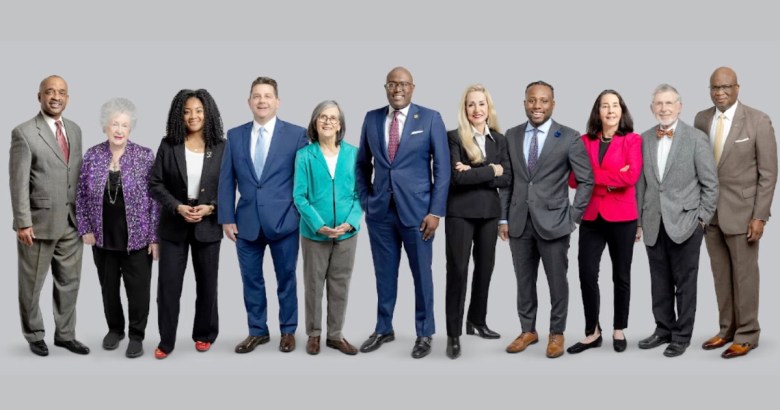
The Little Rock Board of Directors accepted a roadmap for downtown development and inched closer to considering a vote on calling a special election for a sales tax increase at Tuesday’s meeting.
Mayor Frank Scott Jr. introduced ordinances to put his proposed 1% city sales tax increase before voters on Nov. 5.
The board agreed to vote July 30 on whether to put the sales tax increase to voters.
“This is a great first step in the journey to get this on the ballot,” Scott said.
Scott also thanked At-Large Director Dean Kumpuris, who was absent, for adding language to the sales tax resolution that adds a $2 million contingency fund “to cover any unexpected expenses during that year.” If tax collections during a given year are greater than what’s needed for Scott’s plan, excess is added to the contingency fund.
If the contingency fund reaches $2 million, further excess revenue will go to a “special city infrastructure fund, which shall have a division for capital tax receipts and a division for operation tax receipts,” Scott said. Any allocation of these funds would be subject to approval from the city board and a to-be-established oversight committee.
The 1% increase is split into a three-eighth cent tax, which would go toward “general operational purposes,” and a five-eighth cent tax that would go toward “general capital purposes,” according to the ordinances.
Scott has been pushing for a 1% sales tax increase for years, getting one on the ballot in a 2021 special election that voters rejected.
If Scott’s current proposal makes it to the voters and isn’t rejected a second time, the tax would take effect on Jan. 1 and remain in effect until Dec. 31, 2034.
The board also accepted a downtown development plan that’s partially contingent on the proposed sales tax increase.
The Downtown Little Rock Master Plan, released last month, is an ambitious blueprint for transforming and growing the downtown area. Its major goals include doubling the downtown population in the next decade; expanding public transportation and trail systems; and capitalizing on access to the Arkansas River. The plan includes dozens of smaller projects and strategies mapped out in its pages.
The Downtown Little Rock Partnership, a nonprofit that works closely with the city to improve the area, presented the master plan to the city board July 2.
Parts of the master plan will depend on funding from Scott’s proposed 1% sales tax increase, meaning some projects could take longer than projected or won’t happen at all if the increase fails. For example, the mayor’s plan to build an indoor sports complex downtown is entirely dependent on funding from the tax increase.
The board accepted the master plan and the 16 other items on the consent agenda, including resolutions to transfer the websites of the city and Little Rock Zoo to Wordpress, pay for HVAC upgrades at the zoo’s great apes building and provide internet service at Rebsamen Golf Course.
Ward 5 Director Lance Hines said he’s excited about the Master Plan.
“Even though I represent the most western part of the city, having a vibrant downtown is vital to any city growing, so yeah, for sure,” Hines said. “Looking forward to getting it done.”
Vice Mayor and Ward 3 Director Kathy Webb said she’s looking forward to how the master plan will potentially affect churches.
“I go to church downtown and getting a greater number of people to live downtown is important for all the churches that have chosen to remain downtown,” Webb said. “That’s just one small perspective, but I think it’s important.”
The board also approved two resolutions to spend $397,147.71 on further renovations to the Board of Directors Chambers in City Hall, bringing the total cost to just over $1.2 million. The board hasn’t met in its chambers since 2020, and renovations have been significantly delayed.
Ward 2 Director Ken Richardson, who hasn’t attended a city board meeting since May 14, was absent again; he has now missed eight voting meetings and seven agenda-setting meetings as of July 16, with no official statement yet on the reason for his absence.
The city board meets every Tuesday and is made up of 10 city directors, with seven representing Little Rock’s wards and three at-large directors. The board will not be in session July 23. Its next meeting will be July 30, where it will vote on calling a special election for the 1% sales tax increase.
